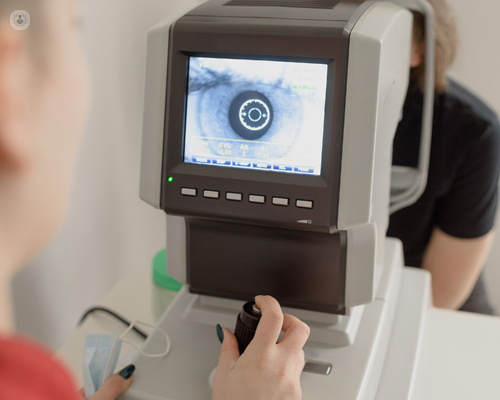Maintaining a good quality of life with macular degeneration
Autore:Macular degeneration, particularly age-related macular degeneration (AMD), can significantly affect vision, making everyday tasks challenging. While it is a leading cause of vision loss, there are many ways to maintain a good quality of life with this condition. With the right treatments, lifestyle adjustments and support, people with macular degeneration can continue to live fulfilling lives.

What is macular degeneration?
Macular degeneration is a progressive eye condition. The macula is the central part of the retina, and is responsible for sharp, detailed vision. Macular degeneration typically presents in two forms:
- Dry AMD: The more common form, characterised by the thinning of the macula and gradual vision loss.
- Wet AMD: Less common but more severe, caused by abnormal blood vessel growth under the retina, leading to rapid vision loss.
What are the treatment options to manage symptoms of AMD?
While there is no cure for macular degeneration, several treatments can help slow its progression and improve quality of life:
- For dry AMD:
- Vitamin supplements, such as AREDS2, can slow the progression in some patients.
- Regular eye exams to monitor changes in vision.
- For wet AMD:
- Anti-VEGF injections: These drugs (e.g., ranibizumab, aflibercept) block the growth of abnormal blood vessels and reduce leakage, helping to stabilise or improve vision.
- Laser therapy: In certain cases, lasers can seal leaking blood vessels.
What lifestyle adjustments can be made to maintain independence with AMD?
Making small changes can make a big difference in preserving independence and quality of life:
- Visual aids: Magnifiers, electronic readers and large-print books can help with reading and other activities.
- Technology: Voice-activated devices and screen-reading software make it easier to navigate phones, computers and daily tasks.
- Lighting: Ensure adequate lighting in living spaces to improve visibility and reduce the risk of accidents.
Supporting mental and emotional well-being with AMD
Macular degeneration can be emotionally challenging, but support is available:
- Join a support group: Sharing experiences with others who have macular degeneration can provide encouragement and practical advice.
- Consult a therapist: A professional can help address feelings of frustration or anxiety related to vision loss.
- Stay active: Physical activities and hobbies that do not require detailed vision, like walking or listening to audiobooks, can promote well-being.
How can further vision loss be prevented with AMD?
Adopting healthy habits can help protect the remaining vision:
- Stop smoking: Smoking is a significant risk factor for AMD progression.
- Eat a balanced diet: Foods rich in omega-3 fatty acids, lutein, and zeaxanthin (like leafy greens and fish) support eye health.
- Wear sunglasses: Protect your eyes from UV light with sunglasses or hats when outdoors.
- Attend regular eye exams: Early detection of any changes can lead to timely intervention.
Living with macular degeneration requires adjustments, but with the right strategies and support, it is possible to maintain a good quality of life and continue enjoying activities that bring joy and fulfilment. Consulting with an eye care specialist ensures access to the latest treatments and resources to manage the condition effectively.


